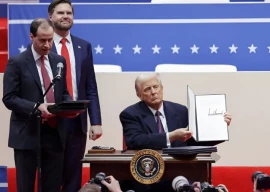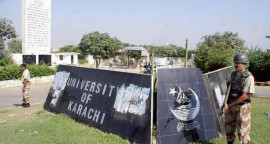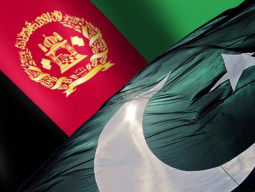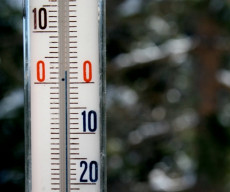
"On the ground, it's almost three times more expensive to come from the north as it does from Pakistan. More expensive and slower," said Vice Admiral Mark Harnitchek, director of the Defense Logistics Agency.
NATO now uses an alternative network of northern routes that pass through Russia, Central Asia and the Caucasus.
Transporting a container from the United States to Afghanistan costs about $20,000, he told a group of defense reporters.
But the cost of ferrying cargo to the Pakistani port of Karachi and then over roads to the Afghan border amounts to only a third of that price, he said.
Pakistan imposed a blockade on NATO supply convoys after 24 of its soldiers were killed by mistake in a US air strike in November along the Afghan border.
US Defense Secretary Leon Panetta said earlier this month that the Pakistan border closure costs the United States an additional $100 million a month.
Before the route cut-off, about 30-40 percent of the fuel used by coalition forces came through Pakistan.
Fuel is now transported over land via the northern routes, while food is flown in on cargo aircraft, he said.
"It was challenging initially and we took a bit of a dip there in terms of days of supply. But now our stocks of food and fuel have never been higher," Harnitchek said.
The supply routes will be on the agenda when the commander of NATO-led forces in Afghanistan, General John Allen, meets his counterparts in Pakistan on Wednesday, officials said.
US officials raised expectations in May that a deal was imminent with Pakistan on the reopening of the routes, but no announcement came and Washington withdrew its team of negotiators.
The United States has refused to issue a formal apology over the air strikes, despite appeals from Pakistan.
Amid continued deadlock, the Pentagon on Wednesday expressed hope that a deal eventually could be reached on the supply routes.
"I think there is reason for optimism. I think we're reaching a point in our relationship with Pakistan that suggests that things are settling down a bit," spokesman George Little told reporters at a Pentagon briefing.
"I think the basis for some kind of agreement on the GLOCs (ground lines of communication) is there and is real and we hope that we reach a resolution," he said.
COMMENTS (30)
Comments are moderated and generally will be posted if they are on-topic and not abusive.
For more information, please see our Comments FAQ
1737438801-0/kai-(2)1737438801-0-405x300.webp)
1737437830-0/fizza-(60)1737437830-0-165x106.webp)
1737426578-0/Untitled-design-(65)1737426578-0-165x106.webp)




















mr obama said yes we can, its pakistans turn to say no you cant, long live pakistan. and its sallies, like britain,china,iran,russia,amerca is a bullying power,its end is near inshallah.
America is a rich country and lot of nice peoples lives there, they can afford to pay 20,000 $ for a 20 ton container, my seggestion is, kindly keep paying 20 K $ and don't disturb the Pakistani establishment. love you all.
They are at the last stage of patience due to closing the supply routs. now think fo ra moment,about the patience of those lost their loved ones.
you are not ready to issue apology,notwithstanding the fact that you made their life a burning desert until unless live on the earth.
Now why crying and complaining because this is your own chosen way and no one coerced and insisted on you to do so.Now face the music and have patience and tolerance till 2014 when US' and US-led NATO's forces shall be withdrawn from Afghanistan.
The extra costs of $100 million a month at the expense of the tax-payers could be wisely spent. They could be given to Pakistan as aid to improve its energy supply, health care and schools for children. Why can't politicians on both sides be more pragmatic and shrug off their stubbornness?
Difficult to comprehend continued closure when both countries are allies in war against terror.
You have not read the quote correctly . USD 20000 is total cost of moving a container from US to Afgnistan . The cost of moving it through Pakistan will only be a fraction of USD 20000. @Zaikam:
You ever ask yourselves why the American's would be willing to pay triple to avoid an unconditional apology? As I recall they have apologized many times to many countries but are holding firm in this particular case. Maybe it's time you question your "establishments" version of events -- or need I remind you that your "establishment" is notorious for making false statements often bordering on the outrageous.
Just three times more? All "Senior" experts have been telling us all along that it was 60 times.
When I have to pick between a Pakistani and a Westerner in terms of truth, I definitely will never trust a Pakistani.
Now you have to pay the price for what have you done..
Let them pay for Panetta's arrogance. Divisions in their lines are inevitable! They'd pay $ 20000/- through northern routes but won't pay Pakistan more than 250, so much for panetta's logics. I think Pakistan should raise it to $15,000, even this is less to what they are paying through central asian states.
As this issue has been thrown into the public arena by the political government of Pakistan the decission if and when reached will have to be such that Pakistan must get a just and fair deal as opposed to what was perceived previously to be a one sided deal in the favour of the US.
“It was challenging initially and we took a bit of a dip there in terms of days of supply. But now our stocks of food and fuel have never been higher,” Harnitchek said.
I must use valuable online space to quote the admiral verbatim, since he means to convey the idea that high fuel and food stocks are a positive indicator of the health of the US ground forces supply chain in Afghanistan.
It is laughable indeed to read this when put to light against the transgression of the Ten Commandments of Supply Chain Efficiency & Optimization found in the bible of any half decent supply chain organization.
Pay that money to our government and see the red carpets roll forth.